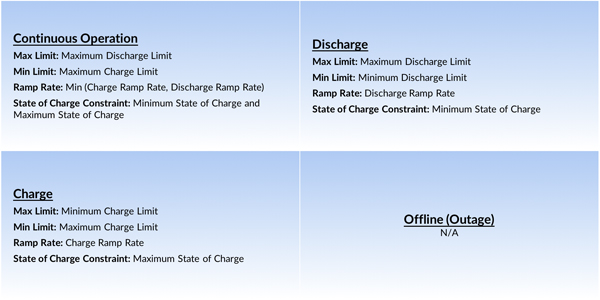By Rich Heidorn Jr.
Electric storage resources (ESRs) 100 kW or larger would be eligible to offer capacity, energy and ancillary services under a straw proposal MISO officials presented to stakeholders Wednesday.
FERC Rules to Boost Storage Role in Markets.)
The Market Subcommittee will take the lead on six of the issues:
- definition, elements and modeling, including minimum size requirements;
- market participation (bid parameters, offers, commitment and dispatch);
- state of charge measurement and management;
- market participation (eligibility, as seller and buyer);
- metering and accounting; and
- settlements (make-whole payments, compensation, performance and penalties).
The Reliability Subcommittee will address reliability (qualification) and non-market products. The Resource Adequacy Subcommittee will focus on capacity and resource adequacy administration.
MISO officials outlined the proposal during a daylong joint meeting of the three subcommittees and the Planning Advisory Committee.
The RTO expects stakeholder discussions through October and completion of the plan for a compliance filing on Dec. 3. Implementation would begin in December 2019. The first resources registered under the new participation model will be able to participate starting March 1, 2020.
In meeting Order 841’s requirements, MISO’s compliance filing will also address shortcomings FERC identified in the RTO’s existing Tariff rules on Stored Energy Resources (SER) – Type II. MISO previously proposed the SER – Type II category in response to FERC’s partial granting of Indianapolis Power and Light’s earlier complaint on its storage rules. (See FERC OKs MISO Plan to Expand Storage.)
Four Commitment Modes
The new rules will apply to batteries, flywheels, compressed air, pumped hydro and any other technologies meeting FERC’s definition of an ESR: one “capable of receiving electric energy from the grid and storing it for later injection … to the grid.”
Resources could be connected to the interstate transmission grid, a distribution system or behind the meter. Demand response, which cannot inject energy, is excluded. The initial ESR participation model also will not accommodate distributed energy resource aggregations across multiple pricing nodes.
The RTO said it will expand the ESR category in the future based on improvements to its Market Systems, the Market Roadmap and advances in storage technologies.
ESRs would participate under four modes of commitment: charging, discharging, continuous operations and outage/offline, as specified by the market participant for individual dispatch periods. When in online mode, storage will be treated as must-run resources.
The state of charge will be managed by the market participant and communicated to MISO via telemetry and offer parameters.
A storage resource would pay the LMP of their commercial pricing node when withdrawing charging energy and receive payment at the LMP during injections. Storage will be eligible for make-whole payments under MISO dispatch decisions consistent with eligibility rules for other resource types.
In addition to providing energy, capacity and ramping, storage will be permitted to offer non-market-based services (reactive supply and voltage control and black start).
Rehearing Request
On March 19, MISO asked FERC to clarify or change some aspects of the order. For example, it requested a phased approach for small ESRs (less than 5 MW). It suggested up to 50 be permitted in the first year and 150 in the second.
It also requested a six-month extension for implementation relating to issues pending in the commission’s separate DER proceeding (RM18-9, AD18-10).
MISO asked for feedback on the straw proposal, including responses to a questionnaire by June 22. The proposal is expected to be discussed at the RASC on July 11 and MSC on July 12. The proposal is also expected to be mentioned at the Energy Storage Task Force meeting on June 27.







